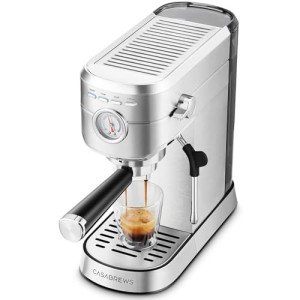Home Use Espresso Machines: A Comprehensive Guide
Espresso machines have ended up being a staple in lots of households as coffee lovers look for to reproduce café-quality brews in the comfort of their cooking areas. The rise in appeal has caused a varied market filled with different models, functions, and costs. This short article aims to supply a helpful introduction of home use espresso machines, helping readers browse their options successfully.
Comprehending Espresso Machines
Espresso machines work by forcing warm water through finely-ground coffee under high pressure, leading to a concentrated coffee beverage referred to as espresso. There are numerous kinds of espresso machines categorized based upon their brewing approaches and level of automation. The most typical types include:
- Manual Espresso Machines: These need the user to manage the pressure and water circulation, permitting for a more hands-on coffee-making experience.
- Semi-Automatic Espresso Machines: These use automatic control over water pressure, while the user by hand grinds and tamps the coffee.
- Automatic Espresso Machines: With the push of a button, these machines instantly control the flow of water, making it easier to brew espresso with consistent outcomes.
- Super-Automatic Espresso Machines: These all-in-one machines handle grinding, tampering, developing, and even milk frothing, making them perfect for users looking for convenience.
- Pill or Pod Machines: These use pre-packaged coffee pods to develop espresso with very little effort, however they limit option in developing techniques and tastes.
Table: Comparison of Espresso Machine Types
| Type | Control Level | Relieve of Use | Cleaning Level | Ideal For |
|---|---|---|---|---|
| Manual | User-controlled | Moderate | High | Coffee perfectionists |
| Semi-Automatic | Partial automation | Moderate | Moderate | Home baristas |
| Automatic | Fully automated | Easy | Low | Hectic people |
| Super-Automatic | Totally automated | Very simple | Very low | Convenience hunters |
| Capsule/Pod | Fully automated | Extremely easy | Very low | Casual drinkers |
Key Features to Consider
When selecting a home use espresso machine, it's important to consider different functions that can significantly impact the quality of espresso and user experience.
- Pressure: Look for machines that provide at least 9 bars of pressure, as this is considered optimum for developing espresso.
- Boiler Systems: Single vs. dual boiler systems figure out temperature stability and the ability to brew espresso and steam milk all at once.
- Grinder: Integrated grinders enable newly ground coffee, which improves flavor. Think about machines with adjustable grind settings.
- Milk Frother: For those who delight in coffees and lattes, a built-in steam wand or automatic frother is vital.
- Size and Design: Consider your cooking area space and visual preferences. Machines are available in different sizes, from compact to large setups.
- Price: Home espresso machines can vary from a few hundred to a number of thousand dollars, so it's essential to establish a budget before checking out options.
Pros and Cons of Home Use Espresso Machines
| Pros | Cons |
|---|---|
| Benefit of developing coffee in your home | Initial financial investment can be high |
| Quality of espresso is often remarkable | Needs some ability, particularly with manual machines |
| Capability to experiment with tastes | Maintenance and cleaning can be labor-intensive |
| Can conserve cash in the long run | Not all machines will fit every coffee preference |
Maintenance and Cleaning Tips
Keeping an espresso machine is crucial for extending its life and guaranteeing consistent brew quality. Here are some useful tips:
- Regular Descaling: Minerals from water can develop in the machine. Espresso Machines Under £200 -3 months, depending upon water solidity.
- Daily Cleaning: Rinse portafilters, baskets, and steam wands after each use to prevent coffee oils from constructing residue.
- Use Filtered Water: This can help in reducing mineral buildup and improve the taste of coffee.
- Change Gaskets and Seals: These elements may use out with time and should be changed to keep pressure and performance.
- Read the Manual: Each machine has particular care directions; following these will guarantee durability.
Frequently Asked Questions About Home Use Espresso Machines
Q1: What is the best budget espresso machine?The best budget espresso machine frequently depends on specific requirements, however designs like the DeLonghi EC155 or the Breville Bambino are popular amongst users for offering fantastic worth. Q2: How long do home espresso machines generally last?With proper maintenance, home espresso machines can last anywhere from 5 to 15 years, depending upon the quality of the machine and frequency of use. Q3: Can I make coffees and lattes with any espresso machine?While most espresso machines can make coffees and lattes, having a dependable
steam wand or frother is important for attaining the best milk texture.
Q4: Are super-automatic machines worth the investment?For those who prioritize convenience and quick brewing, super-automatic machines can be worth the investment, though they might do not have some customizability in brew strength and taste. Q5: What types of coffee beans are best for espresso?While individual preference plays a role, beans identified as" espresso "blends are usually roasted darker, creating rich flavors and a velvety texture when brewed.
Buying a home espresso machine can transform the everyday coffee routine into something special, elevating home brews to café quality. By understanding the various kinds of machines, essential features to consider, upkeep requirements, and weighing the
pros and cons, customers can make educated decisions that suit their private preferences. As the espresso culture continues to grow, no matter the choice, every brew can be a tasty experience waiting to be relished.

